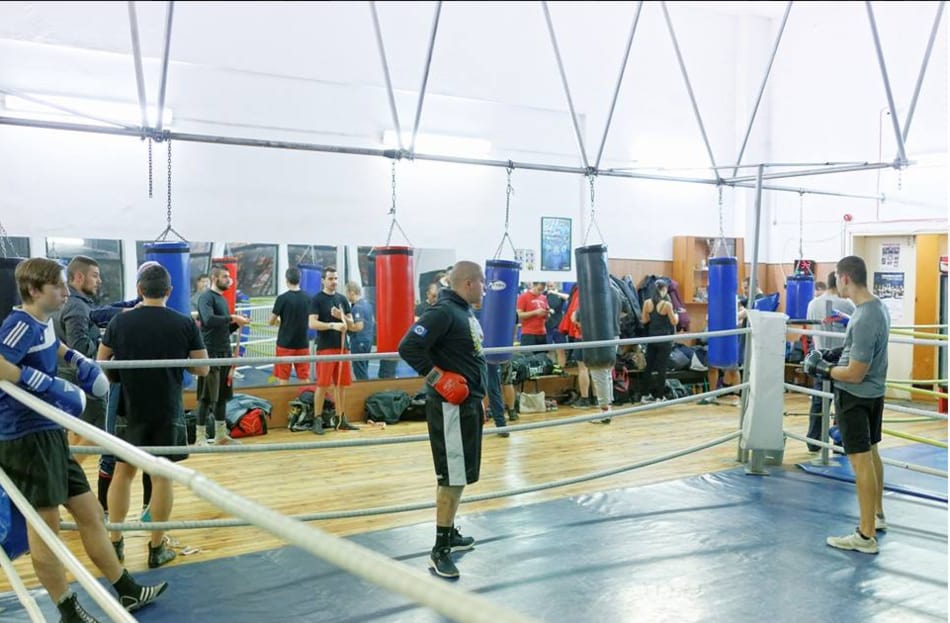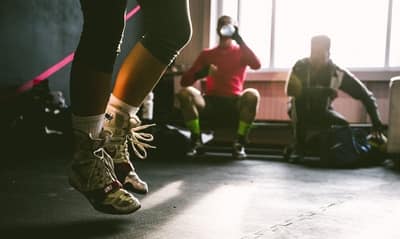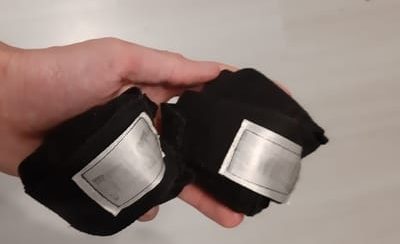
If you’ve never trained boxing before, finding a good boxing gym may not be an easy task for you at all. There are many gyms where you’ll just waste your time if they don’t meet your goals.
For example, if you want to box just to get in shape, the fitness gyms may be the right place for you. But if you’re serious about boxing and really want to develop your skills, you need to join a professional boxing gym.
So the first thing you need to do before choosing a boxing gym is to set your goal. After that, you need to find a gym that meets this goal.
In this article, we’re going to talk about the different types of boxing gyms, their pros, and cons and how you can spot the good gyms. Also, I will give you some tips on your first boxing workout, your first sparring session and some tips on what gear you need as a beginner.
Fitness gyms
As I already mentioned, the fitness boxing gyms are great for getting in shape, losing weight etc. The focus of the workouts of such gyms is more on conditioning rather than technique. You’re going to do a lot of cardio exercises there, such as shadowboxing, rope jumping, push ups, sit ups, and some (not much) heavy bag and mitt work.
In this type of gyms, people rarely spar. The equipment there, isn’t great – only several heavy bags, speed bags, and sometimes there’s not even a boxing ring. The coaches have a lot of experience in conditioning training but not so much in technique or boxing strategy.
The taxes in such gyms are higher than the taxes in most of the other types of gyms but everyone can join them (sometimes the professional gyms don’t allow new, untrained people to join).
To find a good fitness gym for boxing, check out the local gyms and ask if there are boxing classes. Try several places before paying for membership. Choose the gym where you enjoy the workouts, the price is fair and the equipment is on point – there need to be enough heavy bags, speed bags, jumping ropes, etc.
Professional boxing gyms
In those gyms, you’re really going to develop your skills and technique. You can even become a pro boxer by joining such a gym and training long and hard enough. Although the focus of the workouts here is mainly on technique, you can still get in shape.
In the worst case the focus will be only on the technique so you will need to do some conditioning – running, strength exercises (push ups, pull ups) after your technique workout or in separate days (between 1-3 days per week). That way your conditioning will be on point.
In such gyms, there are usually more than one coach and a lot of amateur or pro boxers. There is all the equipment a boxer needs – a big boxing ring (sometimes more than one), a lot of heavy bags, jumping ropes, weights, some speed bags etc.
The coaches there are experienced and probably had careers as professionals. The taxes there aren’t very height for group classes. However, if you want personal training you may need more budget.
In the professional gyms, you’re going to do a lot of heavy bag work, pad work, and a lot of sparring – free and controlled.
How to find a good professional gym
- Type in Google “boxing gyms near me”
- Check out the websites or the Facebook pages of the first 3-5 results
- Look at the photos:
- Is there a good equipment – enough heavy bags, speed bags etc.
- Most importantly – is there a ring (in many fitness gyms there isn’t. That way you can differentiate them)
- Is there a memorabilia on the wall – that means that the gym produces successful boxers
- What’s the daily fee and the monthly cost of the membership of the gym (check if there is a free workout for new people)
- Check out the schedule of the group workouts and pick the gym which has the best schedule according to your needs
If you really want to dig deep when choosing a boxing gym, here are more things you should look for:
- Look for more information about the trainers:
- What was their career, in case they have competed as pro boxers?
- Which boxers have they trained?
- What is their coaching experience – since how many years are they coaching? Which pro/amateur boxers have they trained?
- How many people is every coach training during the group classes? – the fewer people they train, the more attention you will get
- Just type their names in Google (or ask them or the people in the gym if there isn’t enough information online)
- Find more information about the boxers who train in the gym:
- What have they accomplished – record; titles etc
- Since when they’re training in this gym? – Is that their first gym or they came here after they were taught the basics somewhere else
- What’s their style? – are they boxing in a similar way or every boxer has a unique style. Тhat’s important too. You want a gym where coaches help the boxers to develop their own style and don’t teach all of them the same things.
*However, if you need someone to teach you just the fundamentals, you don’t need such a thorough research.
Tips for choosing a gym:
- Consider visiting several gyms before purchasing a membership.
- If you don’t like the coach or he doesn’t like you, go to another gym.
- If the coach encourages brawls and hard sparring, leave the gym. You don’t need this, especially if you’re a newbie.
- If the focus of the workouts are mainly on conditioning and not on technique, leave the gym. You can do your conditioning by yourself but you need a coach to show you the technique.
Small gyms
It isn’t necessary for a professional gym to be big. There are some small gyms owned by former boxers where you can develop advanced skills. In such gyms, you probably won’t see the latest boxing equipment but there is everything a boxing enthusiast needs. And you won’t be charged much.
If you join a small gym, you will get a lot of attention, because there are fewer people. You can ask the coach whatever question you want – about a given technique, about tips on training or to tell you an interesting story from the days he was competing.
I was in such a gym and there were days when the coach trained only 2-3 people. One day he trained only me and my friend. Such workouts really helped me to develop my skills because the coach watched me all the time and pointed out what I was doing right and what wrong.
Pros
- A lot of personal attention
- Low prices
Cons
- Only one or two coaches – you can’t learn from many different people
- Fewer boxers – lesser chance to find good sparring partners
- Less space
Big gyms
The big professional boxing gyms have a lot of gear. There are many heavy bags; speed bags; jumping ropes; a lot of gloves which you can use for free and 1-2 or even more rings. There is also a memorabilia on the wall and a timer that counts the rounds.
At the moment you enter there, you can hear dozens of gloves hitting the heavy bags, and dozens of ropes scraping the floor. You will also smell the sweaty wraps and gloves (you’ll get used to that smell after you spend some time in a boxing gym).
You can meet a lot of pro or amateur boxers there, training like crazy, and also a lot of old-school coaches advising young enthusiasts. Those gyms are usually more expensive than the small ones but you can train with pro athletes and meet experienced coaches.
Pros
- Opportunity for training/sparring with more and different boxers
- Many coaches who can teach you different styles of boxing
- More and better equipment
- More rings for sparring and more space for training
Cons
- Less personal attention – there are more people so the coach can’t give you a lot of attention. Also often in those gyms coaches are teaching the pro boxers more than the average joes.
- Bigger prices than the small gyms
Tips on your first boxing workout
After you choose a boxing gym, it’s time for your first workout. Before I started boxing I had a lot of questions – what gear do I need; is the workout going to be too exhausting; is the coach going to put me in the ring with someone who will beat me up. Yeah, I was thinking all that, and if you’re like me you’re probably wondering the same things. To give you the answers, here’s what I found out after I finally started boxing:
1) You don’t need any equipment
If you aren’t sure you will like boxing and you just want to try it, don’t buy any gear. You won’t need anything for your first workout besides a T-shirt, workout pants and sports shoes. After the warm-up, the coach will show you just the basics – the basic stance and guard, the basic boxing footwork, and how to throw straight punches (jab and cross). Then he will tell you to do some shadowboxing, to get used to the movements.
However, if you want to work on the heavy bag, there are some free to use gloves in almost every gym. Such gloves are probably used by many people before you, so that might be a little unhygienic but who cares if its free :). When I started boxing I actually used free gloves for a whole month before I finally bought my own (yeah, I am a really frugal person).
As you can see, it’s just fine if you don’t have any gear, not only for your first workout but also for the next several weeks.
The only thing you need is boxing wraps to protect your knuckles and support your wrist. You don’t need injuries, especially when you’re just started out. So you better get a pair of protective and elastic wraps. I personally prefer these wraps on Amazon.com. They are really protective and durable and they cost under $10 which is great.
2) Don’t worry that someone is going to hurt you
The coach will never make you spar from day one. He will want to make sure that you understand the basics before he puts you in the ring. Also, your first sparring will be controlled, not a free sparring. For example, your opponent will throw only jabs at you and you’ll need to slip them and counter him. And the coach will make sure that everyone spars with somebody on their level.
Plus the trainers make much of their money from the newbies. So they will make sure that everyone enjoys their workouts and want to come again.
Tips on your first sparring (how to find good sparring partners)
You can practice a given technique on the heavy bag or when shadowboxing but the only way to find out if it’s effective is to test in a sparring. The problem is that it’s quite hard to find a good sparring partner.
You don’t need someone who goes too hard and tries to hurt you, but you also don’t need someone who just touches you because that won’t prepare you for a real fight. You need something in the middle – not too hard, but not too light either.
Depends on your sparring partner, your first sparring session can be very different. Here are the most common types of sparring partners and what to expect from them:
Sparing partners on your level
I recommend sparring with people on your level. They won’t be able to hurt you badly (neither you them), and both of you can learn from each other. It’s good if the coach or someone who is more experienced than you watch your sparring and correcting your form, technique or movement.
Also, you can make a video of some of your sparring and then watch them later. That way you can spot mistakes much easier and know on what problems you should work.
Sparring partners less experienced than you
That’s the other type of people which I recommend sparring with. Chances are they won’t be able to hurt you and you can experiment with different things without hesitating that they will make you pay if you make a mistake.
Of course, be friendly with them and don’t go too hard. Focus on volume, not on power. And remember that some of the techniques that work on them, probably won’t work on more experienced boxers.
More experienced sparring partners
Generally speaking, I don’t recommend sparring with significantly more skilled people because they can easily beat you up. And they’re going to do it, especially if they’re pro or amateur boxers because in such cases the confidence factor enters into the equation. They won’t let someone with much less experience outbox them. That’s why it’s a good idea to avoid sparring with such people for now.
The only situation where you can spar with someone who is significantly more experienced than you is when this person is really friendly. In such cases, they won’t go too hard with you even if you catch them sometimes and they will help you by pointing out what you do wrong. Again, don’t go too hard, even with such people because they can make you pay for that.
Ego sparring partners
Some people spar just to feed their ego, not to learn. Such individuals usually go too hard, trying to hurt their sparring partner (especially if he outbox them). They always try to “win”. But sparring isn’t a contest. There isn’t a winner and a loser there. It’s more like a game – you should try different things, and be creative, not just trying to hurt the other person.
So I don’t recommend sparring with such people, especially when you’re a beginner and still don’t have the skillset to deal with them. If you notice that someone spars more to feed their ego instead of learning, don’t spar with them anymore.
What gear do I need for boxing?
As I already said, for your first workout, you don’t need anything else besides your gym clothes. But if you get hooked on boxing and want to train seriously, you will need some basic gear.
In addition to good boxing wraps (which we already discussed), you will also need:
1) Boxing gloves
You don’t need high-end gloves at the beginning. At least I think so. You also don’t need two pair of gloves – one for sparring and another for heavy bag and mitt work (a lot of people will tell you to get two pairs of gloves). What you need are protective, comfortable but also durable 14 oz gloves. That size works great no matter if you’re going to spar or work on the heavy bag.
The 14 oz gloves are neither too small to hurt someone easily nor too big to make you tired quickly when working on the heavy bag. Their size is perfect.
Besides the size, the other important thing is the price of the gloves. There are many pricey gloves which aren’t that great. It can be really hard to find good gloves on a fair price.
That was a problem for me until I found the Title Boxing pro-style training gloves. Those are really comfortable but also extremely durable and protective gloves. And their price is fair. It was around $40 last time I checked but not sure how much they cost now. You can check their price here, on Amazon.com.
2) Mouthguard
The mouthguard is a must if you want to spar. It’s much better to pay $15 now than thousands of dollars to the dentist later. The mouthguard that I use now is Venum Challenger Mouthguard. It’s really sturdy (I’ve been using it for over 5 months) and it’s also really cheap. If you’re looking for a mouthguard, you can click here to check it on Amazon.com.
3) Shoes and headgear
You don’t need boxing shoes or headgear yet. They have their benefits but they aren’t 100% necessarily at this point. The wraps, the gloves, and the mouthguard are the only pieces of the boxing gear without which you can’t practice the sport.




I think it’s cool that you mentioned that in boxing gyms people have the opportunity to spar with and train with coaches, and even professional boxers! My wife and I have been wanting to join a good fitness program to help us lose some weight! We’re going to have to look for a good gym in our city to join.